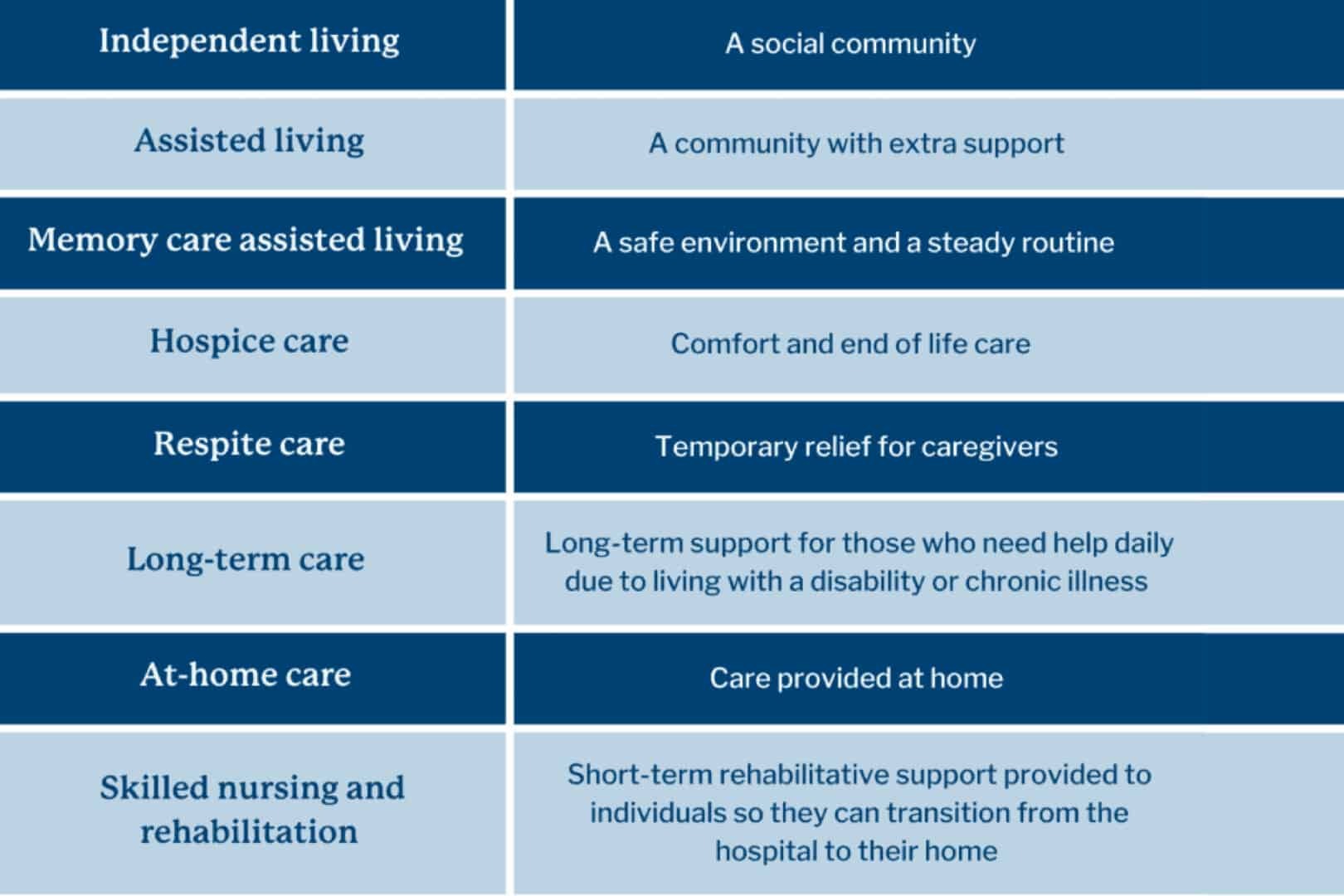Navigating healthcare for your elderly loved one can be a complex and overwhelming process. There are numerous senior care options available and it’s critical to choose one that fits your loved one’s unique health needs.
Understanding the different types of senior care can help you make an informed decision and ensure your loved one receives the support they need. Options include:

Table of Contents:
- What is Independent Living?
- What is Assisted Living?
- What is Memory Care Assisted Living?
- What is Hospice Care?
- What is Respite Care?
- What is Long-Term Care?
- What is At-Home Care?
- What is Skilled Nursing and Rehabilitation?
- Making a Decision
Independent Living
In an independent living facility, individuals have autonomy while receiving as-needed support with household responsibilities.
Independent living primarily serves active older adults, those with disabilities, or individuals who require little to no assistance.
Usually, residents can care for themselves but choose independent living because the facilities provide access to meals, transportation, health care services, and social activities in a setting that enables individuals to be a part of a community while living self-sufficiently.
Independent living facilities free residents from household responsibilities while offering unlimited opportunities to participate in activities and pursue personal interests. Residents can be as engaged or independent as they wish. Independent living places an emphasis on personal choice, community, and autonomy.
What is Assisted Living?
In an assisted living facility, residents receive support with daily tasks from medication management to social activities.
An assisted living facility provides 24/7 care while helping residents with their daily needs, from nutrition and meal preparation to medication management, personal hygiene, housekeeping, and social activities. Assisted livings are for individuals who are unable or choose not to live independently due to physical limitations, disabilities, or health conditions.
Various levels of care are offered in an assisted living facility and are personalized to provide residents with optimal physical and mental health support.
Other key highlights of assisted living include:
- Providing a community and home-like atmosphere with modern furniture, lighting, artwork, etc.
- Extensive amenities and entertainment options to promote social interaction among residents.
- Culinary programs, including farm-to-table ingredients, plant-based menus, restaurant-style dining, and more.
- Figuring out the right time for assisted living? Assisted living facilities offer residential health care in a community environment and support individuals whose medical conditions impact mobility and their ability to perform activities of daily living.
- Assisted living provides a safe environment and assures caregivers that their loved one is medically and physically safe.
What is Memory Care Assisted Living?
A memory care assisted living facility specializes in providing care to residents who have memory loss due to Alzheimer’s, dementia, and other cognitive impairment.
A memory care facility provides a nurturing and safe environment for residents who are impacted by cognitive impairments. Memory care facility staff focus on preserving residents’ cognitive skills while ensuring they are comfortable — and most importantly — safe.
Other key offerings in memory care assisted living include:
- Specialists create personalized care plans for residents to maximize independence and quality of life.
- Teams are trained to understand each condition’s progression to provide the highest level of support and care.
- Sensory rooms may be available to provide gentle light, movement, music, and objects to calm and/or stimulate residents.
Many memory care buildings group residents together based on their degree of memory impairment and the level of care they need. This is a critical element of successful memory care – residents with similar cognitive abilities are found to engage more in suitable activities, build camaraderie with their fellow residents, and feel a stronger sense of belonging.
Key indications that it may be time to start exploring a memory care facility include observing changes in behavior such as:
- Confusion
- The disorientation that impacts physical safety
- Agitation
- Delusions
- Hallucinations
- Wandering and falls
- Decline in physical health
- Refusal of care
When your loved one needs more care than what can be provided at home, finding a memory care facility with around-the-clock, 24-hour supervision to keep residents safe may become necessary.
What is Hospice Care?
Hospice care supports individuals who are in the last phases of incurable disease or illness so they can live as fully and as comfortably as possible.
Hospice care is provided to people who are experiencing an advanced, life-limiting illness. A loved one with about six months or less of their life expectancy would likely be in hospice care. Hospice care encourages families to cherish their loved one’s remaining time and give them the highest quality of life and comfort possible.
Hospice care can be provided either at home or in an inpatient facility, depending on the individual’s needs. Assisted living facilities can also offer hospice care, where a variety of medical, emotional, and spiritual services are available to both residents and their families. Hospice Care might include:
- Palliative care and symptom control
- Inpatient care where 24/7 support is provided at a hospice center
- Respite care
- Bereavement care
What is Respite Care?
Respite care allows for short-term relief for caregivers so they can take a break or go on vacation.
Respite care is temporary care that allows caregivers to take the time they need for personal matters while ensuring their loved ones receive high-quality, uninterrupted care in a safe and supportive environment. Care can be personalized for those with memory impairments to ensure their needs are met.
What Is Long-Term Care?
Long-term care covers services to meet a person’s needs during a short or long period of time.
Long-term care offers a continuation of hospital-level care while providing physical and emotional aid for an extended period of time to individuals with a serious, ongoing health condition or disability. This type of care provides high-touch support for daily living, such as bathing, grooming, and mobility, among other activities, for longer periods of time.
In some instances, long-term care can also provide complex care, such as wound care, burn care, and ventilator weaning.
Long-term care can be integrated in a hospital setting or at a facility. Key services include:
- 24-hour-a-day registered nurses
- Advanced practice nurses
- Certified nursing assistants
- On-site physicians
- Licensed dieticians
- Social work services
- Spiritual support services
- Therapeutic recreation and creative arts therapies
What is At-Home Care?
At-home care allows individuals to get the care they need in their own home.
At-home care, sometimes called home health care, is provided in an individual’s home for an illness or injury. Many opt for at-home care because of the convenience factor. A primary goal of at-home care is to help individuals maintain or improve their conditions.
At-home care services can vary from nursing care to home health aides. Personalized to an individual’s needs, services can be provided by any combination of a medical doctor, nurse, physical, occupational, and speech therapist, social worker, home health aide, and/or other licensed specialist.
An at-home care nurse may be a registered nurse, licensed vocational nurse, or nurse assistant.
Nursing care offered can include:
- Needs assessment
- Developing a plan of care with their doctor
- Administering medication
- Wound care
Home health aid care offered can include:
- Assisting with activities of daily living
- Taking vital signs
- Monitoring physical and mental conditions
- Assistance with health emergencies
What is Skilled Nursing and Rehabilitation?
A skilled nursing facility provides inpatient nursing care to residents who require medical, nursing or rehabilitative services but not to the acute level of a hospital setting.
Rather, a skilled nursing facility offers specialized nursing care, rehabilitation services and assistance with daily activities for patients recovering from a serious illness or surgery. It is a type of post-acute (sub-acute) care and rehabilitation following a hospital discharge.
Of all the care options, skilled nursing facilities provide the highest level of care, similar to that of a hospital, and offer transitional temporary care. The ultimate objective of a skilled nursing facility is to help residents regain health, mobility, and independence so they can return home.
Skilled nursing facilities typically include teams of licensed physical, occupational, and speech therapists, registered nurses, advanced practice nurses, on-site medicine physicians, on-site rehabilitative medicine physicians, licensed nutritionists, a multidisciplinary physician panel, and therapeutic recreation staff.
Skilled nursing facilities support those with serious illnesses and/or rehabilitative needs, such as:
- Orthopedic conditions like hip surgery or joint replacements
- Cardiac and pulmonary conditions like heart attack, congestive heart failure, and chronic obstructive pulmonary disease
- Neurological conditions like spinal cord injury, stroke, and Parkinson’s disease
- Outpatient rehabilitation like physical, occupational, and speech therapy
- General medical support for cancer recovery, arthritis, and other deconditioning illnesses
Making a Decision
At CareOne, we understand how overwhelming it can be to find the right care setting for a loved one. We’re here to help assess your loved one’s circumstances and needs so you can make a decision with dignity.
Call 855-277-8550 or complete the form below to learn more about your care options.


